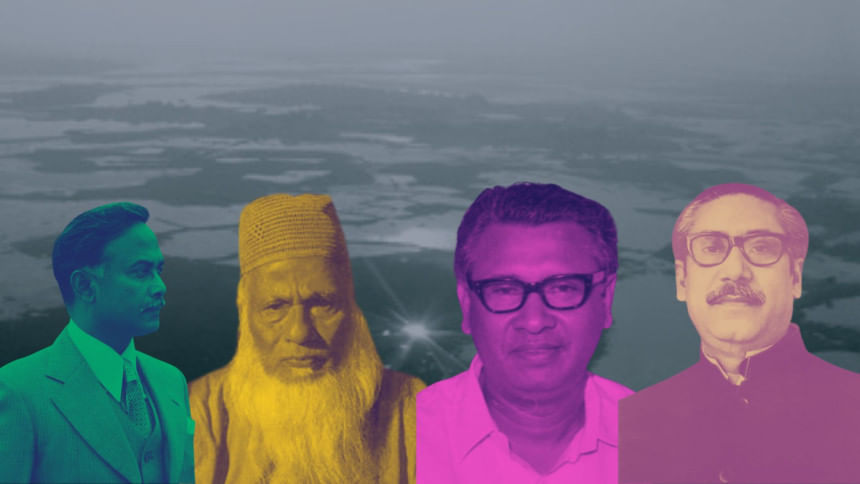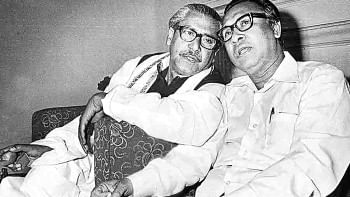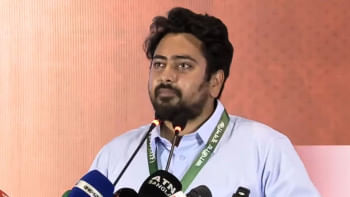Bangladesh’s deified, obscured, and degraded role models

In any country, role models help instil among the young the virtues of empathy, vision, determination, and courage—the very qualities with which they fought injustices and advanced societies positively. Indeed, role models help build emotional intelligence, decision-making skills, and a sense of social responsibility among the youth.
I remember when I was a kid, my father used to cite examples of role models of the time and would tell me, "My son, when you grow up, be like Mr. Jinnah, acquire his qualities of uprightness, integrity and conviction that put him above all else and resulted in the establishment of a separate homeland for the Muslims; be like philanthropist Haji Mohammed Mohsin and make giving an integral part of your character; be like Ishwar Chandra Vidyasagar, and make devotion to your mother a lifelong commitment."
Countries that have their own role models are considered blessed, for a society without role models is like a blind person without a stick who does not know where to put their hands and feet.
Bangladesh's role models
The good news is that Bangladesh has its fair share of role models. However, thanks to the country's parochial and toxic political culture, these role models have often been either deified only to be degraded later or degraded and sidelined. As a result, the young in Bangladesh are either confused or misinformed, which deprives them of the opportunity to look up to someone to build character.
Bangabandhu Sheikh Mujibur Rahman inspired, motivated, and mobilised an entire nation to stand together to fight for the right of self-determination, which in the end, led to the emergence of Bangladesh, an independent sovereign Bangla-speaking nation on earth.
Notwithstanding, this is also true that Sheikh Mujib committed many mistakes—for example, during his brief reign (1972-August 1975), he trashed parliamentary democracy and replaced it with one-party dictatorship; made himself the life-long president, gagged freedom of expression, and suppressed opposition.
However, during her autocratic and self-aggrandising reign (2009-August 2024), Sheikh Hasina white-washed her father's mistakes and put him on a pedestal and nearly deified him, at the neglect if not at the cost of other leaders, with the result being that as soon as she and her government fell in August 2024 through a mass uprising, the cycle reversed, with Sheikh Mujib now turned into a villain.
This is both sad and unacceptable, regardless of his missteps, which no doubt were plenty and of a very serious nature. Let us not forget that without Sheikh Mujibur Rahman, the fate of Bangladesh would have been much different today. Bangabandhu must be acknowledged and respected accordingly. Now the question is, given the pivotal role he played in the processes that formed Bangladesh and his horrendous missteps afterwards, is there a way to reconcile these two opposing attributes and acknowledge and respect Sheikh Mujibur Rahman properly? Time is ripe to re-appraise Bangabandhu Sheikh Mujibur Rahman more objectively so that the people of Bangladesh, especially the young, get inspired by the examples of his bravery and conviction that led to the creation of this nation, and at the same time, be aware of his missteps and shun them.
Among Bangladesh's most inspiring leaders is Maulana Abdul Hamid Khan Bhashani.
He was one of those rare politicians/leaders who never aimed for power; instead, he made the cause of the disadvantaged and fighting against injustices his lifelong mission. Yet this great man has never been recognised nor profiled in a way he ought to have been.
Then, there is the case of Tajuddin Ahmed, who headed the Bangladesh government-in-exile. He was someone who, in the most challenging circumstances, successfully led the Liberation War, someone who uniquely combined patriotism with qualities of leadership, strategic thinking, modesty, piety, and humility and yet neither he nor his contributions have been recognised in a manner they should have been. Instead, Tajuddin Ahmed has been sidelined.
Next is General Osmani, commander-in-chief of the Bangladesh liberation forces, a model of courage and discipline, who also has never been recognised and profiled, duly.
Then, there is the case of General Ziaur Rahman, a freedom fighter who is better known for his radio declaration of independence of Bangladesh and his role in the Liberation War as a sector commander.
However, in addition to his heroic contributions in the Liberation War, Ziaur Rahman needs to be remembered and acknowledged more for the transformative role he played as the president of Bangladesh. Instead, the recently deposed regime had demonised Zia as a traitor! This was not just wrong and sad, but also despicable.
Bangladesh has also been fortunate to have had in its midst NGO leaders such as Nobel Laureate Professor Muhammad Yunus, Sir Fazle Hasan Abed and Dr Zafarullah whose community-based innovations and contributions—microcredit, non-formal education and integrated rural development, and people-centric health services, respectively—empowered the poor and lifted millions out of poverty, not just in Bangladesh but globally and yet, no serious efforts have been made to acknowledge them nor their works, as prominently and insightfully as these ought to have been.
For much too long, neglect, degradation and sidelining of Bangladesh's role models have dwarfed Bangladesh morally and intellectually.
The July uprising has offered the perfect opportunity to re-appraise, rectify and reinstate the country's devalued role models and inform the youth of the qualities with which they established and advanced Bangladesh.
Professor M. Adil Khan is an adjunct professor at the School of Social Science, University of Queensland, Australia, and a former senior policy manager of the United Nations.
Views expressed in this article are the author's own.
Follow The Daily Star Opinion on Facebook for the latest opinions, commentaries and analyses by experts and professionals. To contribute your article or letter to The Daily Star Opinion, see our guidelines for submission.

 For all latest news, follow The Daily Star's Google News channel.
For all latest news, follow The Daily Star's Google News channel. 











Comments